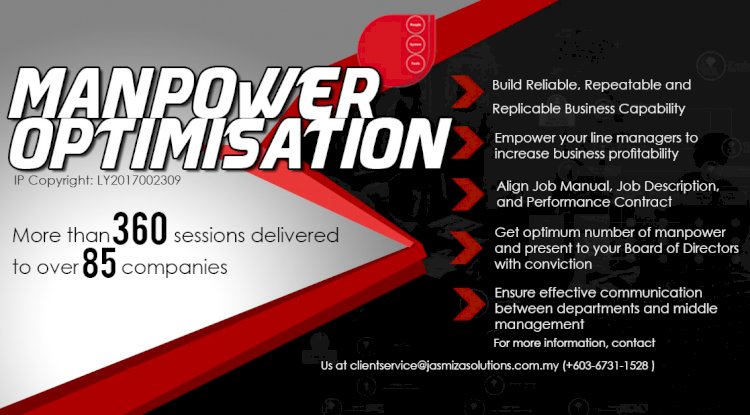Building Capability with Performers
How is Capability different from #Capacity, and #Competency? #Capability is developed by putting focus onto these 3 elements: people, systems and tools, whereby institutionalised capabilities refers to a set of critical areas that an organisation really want to be good at, until everyone in the organisation are well equipped with the skill, knowledge, attitudes and tools to carry the capabilities, by heart. To some extent, an institutionalised capability can be a company's competitive advantage or branding as their work culture consistently improves performance and brings them to a greater height.

#Capability is developed by putting focus onto these 3 elements: people, systems and tools, whereby institutionalised capabilities refers to a set of critical areas that an organisation really want to be good at, until everyone in the organisation are well equipped with the skill, knowledge, attitudes and tools to carry the capabilities, by heart. To some extent, an institutionalised capability can be a company's competitive advantage or branding as their work culture consistently improves performance and brings them to a greater height.
How is Capability different from #Capacity, and #Competency?
If I can use a simple analogy to explain these three concepts, my best choice is to observe these three conditions, allow me to tell::

1. Competency is about a person's ability to perform a set of tasks/job/acclivities.
These abilities range from beginner to expert, for a specific skill set or some called this as technology rulers.
For example, We have a person who drives. His job is a driver. Mr Driver has such experience, skills and knowledge in driving that his competency level is intermediate. Hence, he drives a #GRAB car to earn some income. Attitude aside, Mr Driver is a competent driver.

2. Capability is about how a competent person is made capable of delivering a job.
This is where a person is equipped with the right system and tools so he/she can perform effectively and efficiently.
For example, while Mr Driver is a competent driver, without the road system and a car, Mr Driver still cannot perform his job now that he is not capable.
Or, on the contrary, if Mr Driver is equipped with an F1 Racing Car, and to perform in the F1 Racing System, it is still a doubt if Mr Driver can perform well as his competency is only intermediate and his experience is only driving normal cars.
So this explains the relationship between competency and capability.

3. Capacity is about SIZE. How much load can a person/organisation take in a cycle and how many cycles can they maximally operate.
When it comes to economy of scale, a business has to properly determine capabilities to know how much can they produce, at the best cost so they can offer the best price. Increasing capacity is proportionate to increasing cost, but to be the market leader, SIZE is key.
So instead of having one F1 Driver, some companies will opt on having 50 of Mr Drivers driving on a designed set of systems with an economy car. When at first, GRAB used no liability approach (they started as not owning any car, but to provide system and tools to public drivers) now, they own many cars for drivers to rent from them. Strategies change from time to time to increase business capacity
But underneath all these concepts is just one key element: The right driver with a positive attitude towards performance.
Imagine if your manpower competency is at an expert level, but does not have the attitude towards performance.
This is when most companies are trapped with 'highly paid' subject matters who don't contribute enough to #impact business performance.
What is #attitudetowardsperformance, by the way?
Attitude towards performance is different from just a positive attitude or workplace attitude. These two have been discussed at lengths since the machine evolution era and many batteries are available to measure them,
ATP (attitude towards performance), is a set of behaviours that show that a person cares, wants and is willing to do anything it takes to perform better, every time.
Although I and my team have yet to find a construct, or reliable battery to measure this feature, we have observed the following from 200 over a business we have served:
1. A performer always wants to know why
Why this must be done in such a way, why him/her, why it is important, why this has become urgent. A performer has a caring attitude on impact. They want to be assured that, if they put their 100% in something, they can feel and see how it changes anything important. In contrary, with the millennial attitude of 'what is in it for me'; #WIIIFM, performers do not do anything for themselves only, or in another angle, they can perform for a greater good.
This is quite an evidence if we check on history where legends sacrificed themselves and everything they have for the leader they believe in his/her course.
2. A performer always wants to do things better, faster or more
Repetition is boring. But to some extent, repetition is key to efficiency. One behaviour that we observed is that a performer, cannot be put in a long term operational mode. The most we can reap from a performer is for 3 cycles and then they will be wanting to change strategy or change the rule. If we analyse how the F1 championship has been changing its rules so frequently that it keeps the racing team uncomfortable, so they reinvent themselves more to meet the requirement or exceed expectation to the unpredictable new rules.
If you have performers in your organisation, please make sure your organisation can handle them. A performer can turn to a worse rebel when they are stuck at not being fully utilised but need to stay for the sake of money, in other words, they don't have a choice to leave. They can be very toxic and cancerous.
3. They are aggressive, to an extent, arrogant, but they know when to be humble and hungry
How does Lewis Hamilton manage his own ego, but keep on playing on the same game just to win 4 championships in a row? And when he talked, he knows who to thank and when to mention his team and his partner.
Unfortunately, some performers end up with a big hard head. Hahaha! In business, the game changes not only the rule but the field. As the company grows, companies will explore a new field where everything is new. This is like trying to put Lewis Hamilton in a squash court.
4. They unlearn, and relearn in a sshorter, fastercycle
They are too fast, sometimes they met with an accident. But performers can rise faster than everyone else if they haven't set themselves as a tree, that's it. That reads multiple books, they read to find answers (this is somehow can backfire themselves in many ways), and they can change from being a true believer to total opposer depending on their own analysis of the context.
5. Not all performers are strategists, not all strategists perform!
Some performers are built to execute, therefore, they want to know if the rule is fixed for them to start the race. Rule changers are strategists, sometimes strategist has no experience in the race but works on variables that can impact the result.
I see in this case that, a performer are more likely to adhere to rule set; integrity Strategist, if not guided with values, are more likely to corrupt the system. Strategist takes more risk while performers, calculates everything, making sure execution is flawless by seamless tactical planning.
We see this all the times in the movies.
However, in this I4.0 era, performers analyse data to ensure that they are agile enough should the strategy fails.
In a nutshell, a performer can always become non-performer, that is why I guess, I feel like discussing this matter. If a performer can from time to time measure their attitude towards performance, we hope that this can help them sustain their performance instead of turning into a toxic and cancerous cell in the organisation. Some of our assumptions on the performer now can be challenged:
a. A subject matter expert is not necessarily a performer. They are the one that most of the time being highly paid.
b. A performer, sometimes detaches with the strategist, because of value corruptions, cognitive dissonance or mission misaligned.
c. Attitude towards performance is not just a list of traits or personality, it can rise and fall, hence, one must always check their motives and motivation to ensure that they are not trapped in a vicious cycle.
d. Strategists hate performer guts and vice versa, but they need each other like cocoa needs butter.
e. Attitude towards performance is one missing battery for manpower recruitment right now, as employee attitude and other measurement tools have yet to differentiate a performer from the rest.
f. Skill set of a performer has yet to be scientifically identified, for now, we can still use what observation and hypothesis we create based on our own experience
Stopping for now, but not ending yet,

















